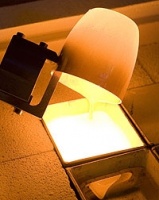Prof Martin Kilo, manager of the expert group for glass and high-temperature materials at Fraunhofer’s Institute for Silicate Research, told The Engineer: ‘We have speeded up the process for developing new glass compositions.’
In order to develop glass with a new set of characteristics, experts mix close to a dozen compounds from potential elements. The compounds are heated in a furnace until they become soft, then they’re poured into a mould and left to cool gradually down to room temperature.

During the process, samples from the viscous glass are taken for testing in order to find out how viscous it is, how well it wets metals, and how it crystallises.
This is a time-consuming procedure, but the robot is reportedly able to process 16 glass samples in 24 hours — a task that would take a single employee approximately two weeks to complete.
The robot puts a mixing cup on a scale and moves it under 14 storage vessels, from which a certain amount of powder is poured into the cup.
Kilo explained: ‘The robot mixes the individual ingredients by closing the cup and shaking it, just like a bartender does with a cocktail shaker.’
The robot arm then grabs a crucible, puts it onto the scale, fills it with a certain amount of mixed powder and puts the crucible into one of the five furnaces available.
This step is repeated several times because gases build up when the powder is heated and foam starts to form, meaning the powder shrinks during the melting process.
Once the glass is viscous, the robot arm removes the crucible, pours the glass into a fresh mould and places it in a stress-relieving furnace. Here, the glass cools slowly in a controlled manner from approximately 600–800°C down to room temperature.
‘Primarily the robot has been designed for Fraunhofer to help its customers develop new glasses,’ explained Kilo. However, he said that if there was demand from other glass manufacturers for the machine then the group would consider making additional versions or even selling its own.
The robot was introduced at the Productronica fair in Munich this week.




Nanogenerator consumes CO2 to generate electricity
Whoopee, they've solved how to keep a light on but not a lot else.